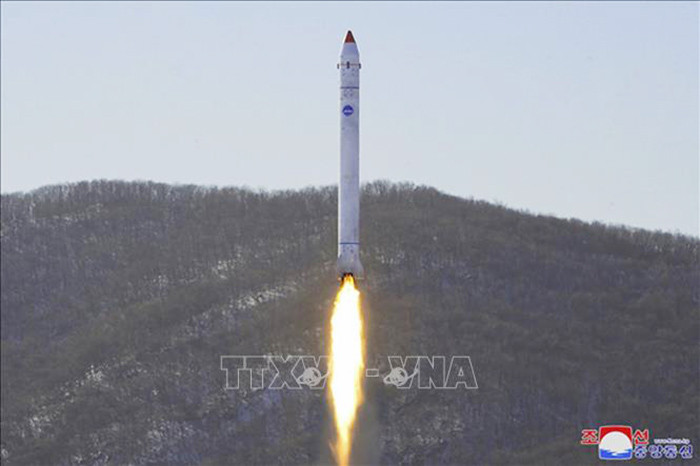North Korea informs Japan of satellite launch plan
Science - Technology - Posted date: 15:28, August 22, 2023

Image released by the Korean Central News Agency (KCNA) on December 19, 2022 of the test launch of an experimental satellite-carrying rocket at the Sohae Satellite Launching Ground in Tongchang-ri
According to the Japan Coast Guard, in a notice sent on the morning of August 22, North Korea mentioned three areas in the sea that this launch could affect. Two of these areas are located on the west side of the Korean Peninsula, while the third is located on the east side of the Philippine island of Luzon. All three areas are outside Japan's exclusive economic zone.
Tokyo believes the plan is a re-test of North Korea's failed military satellite launch in May. Japanese Prime Minister Fumio Kishida has instructed relevant government agencies to carefully analyze the move and coordinate with the US and South Korea to urge Pyongyang not to carry out the launch.
North Korea's announcement came as the leaders of Japan, the United States and South Korea agreed last week to step up cooperation to stop North Korea's development of nuclear and missile capabilities.
Earlier, the National Aerospace Development Administration (NADA) of North Korea confirmed that on May 31, it had launched the military reconnaissance satellite Malligyong-1, mounted on a new-type carrier rocket Chollima-1 from the Sohae Satellite Launching Ground in Cholsan County, North Phyongan Province. However, the launch failed due to engine failure and fuel stability issues. NADA also affirmed that it would thoroughly investigate the major shortcomings exposed in this launch, take urgent scientific and technological measures to overcome them and conduct a second launch as soon as possible.
North Korea said leader Kim Jong Un considers the development of military reconnaissance satellites a top priority, as a necessary counterweight to the growing US military presence in the region.
Also on August 22, the North Korean central news agency KCNA criticized the "warlike nature" of the large-scale military exercise called Ulchi Freedom Shield (UFS) that the US and South Korea launched on August 21, with many strategic weapons and the participation of several other countries such as Australia, Canada, the UK, Greece, Italy, New Zealand and the Philippines.
The KCNA article warned that the possibility of “thermonuclear war on the Korean Peninsula is gradually becoming more real.” KCNA accused Seoul, Washington and Tokyo of holding a three-way summit at Camp David last week to approve a series of documents to “detail, plan and elaborate” nuclear war provocations.
KCNA stated: “An unprecedented large-scale thermonuclear war is approaching the Korean Peninsula at all times and in all places... If the Camp David agreements are incorporated into the exercise... the possibility of a thermonuclear war breaking out on the Korean Peninsula will become more realistic.”
According to VNA
